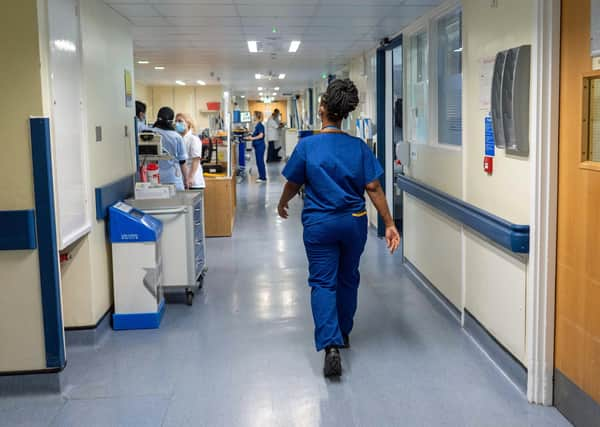The Liverpool Women's Trust: all the key numbers for the NHS Trust in January


More than 15,000 patients were waiting for routine treatment at the Liverpool Women's Trust in January, figures show.
The figures come as a leading cancer campaigner calls on the Government to launch a dedicated plan to tackle the backlog in cancer treatment.
Advertisement
Hide AdAdvertisement
Hide AdNHS England figures show 17,796 patients were waiting for non-urgent elective operations or treatment at Liverpool Women's NHS Foundation Trust at the end of January – down slightly from 17,850 in December, but an increase on 13,326 in January last year.
Of those, 2,477 (14%) had been waiting for longer than a year.
The median waiting time from referral at an NHS Trust to treatment at the Liverpool Women's Trust was 23 weeks at the end of January – the same as in December.
Nationally, 7.2 million people were waiting to start treatment at the end of January.
Advertisement
Hide AdAdvertisement
Hide AdProfessor Pat Price, co-founder of the #CatchUpWithCancer campaign and leading oncologist, said: “Today’s data shows, yet again, more patients waiting longer than ever before for life-saving cancer treatment.”
“Without a cancer plan and investment into treatment solutions, such as radiotherapy, I am worried that each month the number of cancer patients missing life-saving targets will continue to swell.”
Separate figures from NHS England show that of 13 patients urgently referred by the NHS who were treated at the Liverpool Women's Trust in January, zero were receiving cancer treatment within two months of their referral.
A month previously – when 14 patients were referred – two were treated within 62 days.
Advertisement
Hide AdAdvertisement
Hide AdIn January 2022, 4 patients were treated within this period, out of 12 that were referred.
Across England, 54.4% of the 15,401 cancer patients who had their first treatment in January after an urgent GP referral had waited less than two months, down from 61.8% the previous month and the lowest figure since records began in 2009.
The Nuffield Trust said NHS will be straining to deliver services for "years to come".
Dr Billy Palmer, Senior Fellow at the organisation, added: “The concerning consequence of the unrelenting pressure on the NHS is that patient safety is being compromised.”
Advertisement
Hide AdAdvertisement
Hide AdOther figures show 1.6 million patients in England were waiting for a key diagnostic test in January – a rise on 1.5 million in December.
At the Liverpool Women's Trust, 469 patients were waiting for one of four standard tests, such as Cystoscopy, DEXA Scan, Non-obstetric Ultrasound, or Urodynamics - Pressures & Flows at this time.
Of them, 26 (6%) had been waiting for at least six weeks.
NHS national medical director Professor Stephen Powis said despite strikes and respiratory illnesses over the winter, NHS staff "continued to deliver for patients, bringing down elective waits, treating more cancer patients and delivering more diagnostic tests for people than ever before."
He said: “The NHS will not stop in its efforts to bring down 18 month waits for elective care and bring down the cancer backlog, but it is inevitable that if the upcoming junior doctors strikes happen they will have a significant impact on cancer care and routine operations that were scheduled to happen.
“As ever, we will do all we can to limit the impact to patients,” he added.